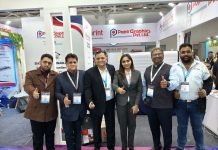
Katsura India, a joint venture for rubber roller production between the Delhi-based Provin Group and Katsura Japan, hosted an open house on 29 March at its new roller manufacturing plant in Faridabad. The event attracted mainly multicolor offset press owners to see and understand the company’s process in handling used rubber rollers from presses in the field and restoring them to brand new health using imported NBR compounds and techniques with strict adherence to the processes of Katsura Japan. Provin Technos and Katsura officially launched Katsura India at a well-attended evening event during Printpack India on 1 February 2025.
Depending on their use, rubber rollers in offset presses need to be replaced periodically and are generally sent for re-rubberizing or remanufacturing. Akshay Kaushal, executive director of sales at Provin Technos, which sells and services RMGT’s multicolor offset presses, said that the Indian market previously offered either high-quality rollers at premium prices or low-cost alternatives with compromised quality. “That is what gave us the idea of starting a Japanese roller plant in India,” he explained. Kaushal underwent a two-month training program in Japan to gain in-depth knowledge of Katsura’s rubber roller manufacturing process.
During the open house, customers were given a tour of the facility by Vinay Kaushal and Pradeep Nandagopal, directors of Provin Technos. Showing the complete roller re-manufacturing process, from initial cleaning to the final polishing and inspection, Kaushal said that, unlike many other roller factories that may leave traces of the previous rubber compound, Katsura India uses sandblasting or chemical cleaning to ensure the steel spindle is entirely free of residue. This ensures optimal rubber adhesion in the next manufacturing phase.
The mixing of rubber compounds in a contamination-free cleanroom was highlighted as a critical step. The plant uses Nitrile Butadiene Rubber (NBR), a synthetic rubber copolymer known for its excellent resistance to oils, fuels, and chemicals. NBR is particularly suitable for oil-based and UV offset inks – currently the primary target market for Katsura India’s rollers. The company maintains the specifications and the capability to remanufacture the rubber rollers of all the global offset press manufacturers.
The appropriate rubber compound is processed and applied to the readied roller cores and then vulcanized. “Once we have around 80 to 100 rollers, they are placed in the curing oven for 8 to 9 hours under high air pressure,” Kaushal explained. This curing process is essential for vulcanizing the rubber, ensuring its durability and elasticity.
Following the curing stage, the rollers are transferred to the grinding and polishing section. Specialized machines grind the rollers to the required dimensions and other specifications including surface texture and hardness. Every roller has an identifier and each step of the process is measured and recorded, for future reference. The final stage involves quality checks. Once the rollers meet Katsura’s standards, they are cleaned, packed with protective material, labeled, and dispatched to customers.
Maintaining a clean and contamination-free environment is a top priority at Katsura India. Each section of the plant is enclosed and dust-proof, with strict access controls. Employees handling the rubber compounds and rollers wear protective gear and follow safety and quality protocols in compliance with Japanese manufacturing standards.
“We ensure that the rollers we supply to our customers across India are of the highest quality. Our processes strictly adhere to Japanese standards without any deviations,” Kaushal affirmed. Initial feedback from customers has been excellent with printers acknowledging that the rollers match the quality and characteristics of rollers originally supplied by the OEMs with their new presses.









